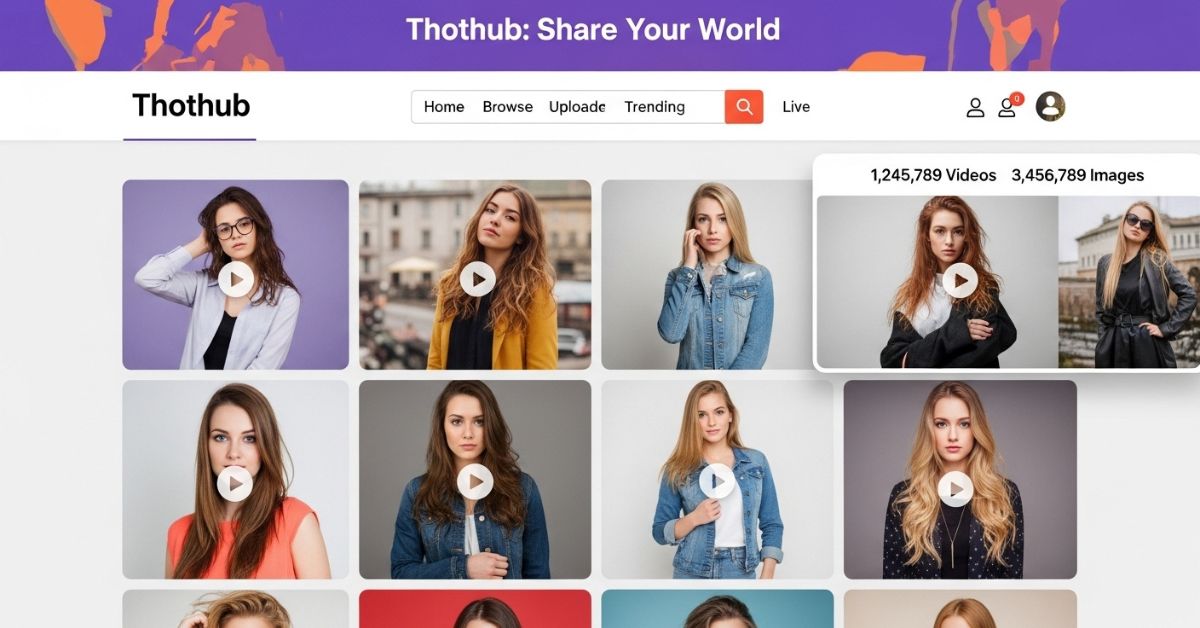Contents
Introduction
The internet has always been a place of discovery, creativity, and connection. But alongside its bright side, there’s a darker corner where privacy, ethics, and legality are often ignored. One website that perfectly represents this darker side is Thothub.
At one point, Thothub was one of the most talked-about websites online — not because of innovation or success, but because of the controversy and harm it caused. It became a symbol of how quickly an online community can turn into a global problem when boundaries are ignored.
Let’s explore the full story of how Thothub rose to popularity, why it became so notorious, and what lessons the world learned from its downfall.
What Was Thothub?
Thothub started as a platform where users could share photos, videos, and other media. On the surface, it looked like any other content-sharing website. However, beneath that normal appearance, the site became a hub for leaked and stolen private material, much of which was shared without the creator’s permission.
The majority of the content on Thothub came from creators who sold exclusive material on paid subscription platforms like OnlyFans, Patreon, and similar sites. Instead of supporting these creators directly, users began uploading their content to Thothub — making it available for free.
This act of sharing private material without consent was what made Thothub both popular and infamous.
How Thothub Became Popular
Thothub’s rise in popularity can be explained by how the internet rewards convenience and anonymity. People were drawn to it for a few reasons:
- Free Access to Exclusive Content: Users could view premium material without paying for it.
- Anonymity: Users could upload and share content without revealing their identities.
- Community Feel: Thothub’s forum-style layout made people feel like they were part of a private online club.
The platform offered categories, tags, and easy navigation, which made finding specific material simple. In a short time, Thothub had millions of visitors from around the world.
But this growth was built on unethical foundations. What made the site successful was also what made it illegal and controversial.
The Ethical Problem
Thothub’s biggest issue was consent. Much of the content being shared came from creators who had no idea their work was being reposted. For many, this was more than just losing money — it was a violation of trust and privacy.
Some creators even found personal and private photos that were never meant for the public being uploaded and discussed on the site. This caused emotional distress and real harm to their personal and professional lives.
While users saw it as just another source of entertainment, for the people affected, Thothub was a source of exploitation. It revealed how easily the internet can blur the line between freedom of sharing and violation of privacy.
The Legal Issues
As Thothub’s popularity grew, so did the attention from law enforcement and digital rights organizations. The site faced several legal problems:
- Copyright Infringement: The unauthorized sharing of content violated copyright laws.
- Privacy Violations: Many creators filed complaints about their private materials being leaked.
- Negligence by Administrators: The people behind the site did little to remove illegal content, even after multiple reports.
In 2020, these issues came to a head when investigations began into Thothub’s operations. Authorities traced the website’s servers, identified some of the administrators, and found that the platform had become a large-scale distributor of stolen content.
This investigation eventually led to Thothub’s shutdown, marking the end of one of the internet’s most controversial websites.
Why Thothub Was So Notorious
There are many reasons why Thothub became one of the internet’s most notorious sites. It wasn’t just because it hosted stolen content — it was because of the scale, carelessness, and damage it caused.
- Massive Amount of Leaked Content: Thousands of creators had their private work posted without consent.
- Lack of Accountability: The administrators ignored takedown requests and did little to protect victims.
- Encouragement of Illegal Behavior: Some users even shared tips on how to hack or steal content.
- Public Exposure: When the media started reporting on Thothub, it became known worldwide as a prime example of digital exploitation.
What made Thothub stand out was not only its content but the culture it created — one where people felt it was acceptable to consume and share stolen material.
The Public Reaction
When news of Thothub’s activities spread, the public reaction was intense. Creators spoke out on social media, sharing how their private work had been used without permission. Advocacy groups for digital privacy and women’s rights demanded stronger laws to prevent such exploitation.
Even everyday internet users began to realize how dangerous and unethical these kinds of platforms were. The discussions around Thothub opened up a much-needed conversation about consent, privacy, and respect online.
For many, the Thothub case was a turning point — a reminder that digital content is still someone’s property and that violating privacy has real-world consequences.
The Shutdown
In 2020, after months of investigation and growing public pressure, Thothub was officially taken down. Hosting companies withdrew support, domain providers suspended the site, and authorities began pursuing the people behind it.
The shutdown was a major victory for creators, especially those who had been victims of leaks. It also sent a strong message to other similar sites — the internet is not beyond the reach of the law.
After the closure, a few copycat sites tried to appear, but none managed to gain the same traction. Law enforcement agencies acted quickly to shut them down as well.
The Lasting Impact
Even after its closure, Thothub left a lasting mark on internet culture. It became a case study for digital privacy and online ethics. The site’s story pushed creators, platforms, and lawmakers to rethink how online content should be protected.
Platforms like OnlyFans, Fansly, and others started adding stronger privacy measures, such as watermarks, reporting tools, and anti-leak systems. Governments also began paying more attention to online safety laws, ensuring that people who share private material without consent face consequences.
Thothub’s fall also made internet users more aware of their own digital behavior — reminding everyone that clicking, downloading, or sharing something online can have serious ethical and legal implications.
Lessons Learned
The Thothub case teaches us several valuable lessons about the online world:
- Privacy is a Right: Everyone deserves control over their personal and creative content.
- Free Isn’t Always Right: Accessing or sharing leaked material might seem harmless, but it causes real harm.
- Accountability Matters: Platforms must take responsibility for what they host.
- Ethics Over Curiosity: Just because something is available online doesn’t mean it should be shared or viewed.
These lessons are important not only for creators but also for regular users who browse, share, and consume online content every day.
Conclusion
Thothub’s story is a reminder of how quickly popularity can turn into infamy when ethics and laws are ignored. What began as a sharing platform became one of the internet’s most notorious sites — a place that caused real harm and changed how people think about online privacy.
Its rise and fall highlight the importance of consent, respect, and responsibility in the digital world. As the internet continues to evolve, it’s up to all of us — users, creators, and platform owners — to make sure history doesn’t repeat itself.
Thothub may be gone, but its story continues to influence how we view privacy, ethics, and accountability online.

